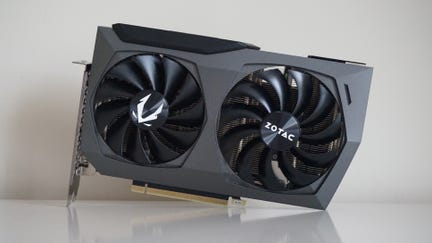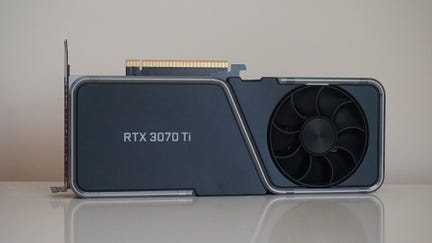Nvidia RTX 3070 vs 3070 Ti: how much faster is Nvidia's latest GPU?
See how they compare to the RTX 3080, too
With the launch of Nvidia's GeForce RTX 3070 Ti, we've now got a complete suite of high-end RTX 30 cards to choose from - or at least we would under ordinary circumstances, the current graphics card shortage notwithstanding. While we wouldn't advise trying to buy a new graphics card right this second due to the ongoing stock problems, you've probably had your eye on at least one of these cards for quite some time now, so we've put the RTX 3070 and RTX 3070 Ti head to head to show you exactly what kind of performance you can expect to see from each card once they're more readily available. And to help you make an even better buying decision, I've also included my RTX 3080 figures in here, too, for the ultimate RTX 30 face-off.
Representing the RTX 3070, RTX 3070 Ti and RTX 3080 in this head to head are the Nvidia Founders Edition of the RTX 3070 Ti and 3080, and Zotac's GeForce RTX 3070 Twin Edge GPU. I ran all three cards at their default clock speeds, and I've kept ray tracing and DLSS switched off as well so we can get the best look at their raw performance.
As for the rest of my PC specs, I paired each card with my usual Intel Core i5-10600K processor and 16GB of Corsair Vengeance Pro RGB RAM, and put them head to head in my suite of graphics benchmarks, taking an average frame rate from their own built-in benchmarking tools or from my own repeatable manual gameplay tests. These games include a mix of blockbusters from the last couple of years: Shadow Of The Tomb Raider, Total War: Three Kingdoms, Final Fantasy XV, Monster Hunter: World, Assassin's Creed Valhalla, The Witcher 3, Metro Exodus and Cyberpunk 2077.
Given how powerful these graphics cards are compared to the rest of Nvidia's RTX 30 family, I've focused primarily on how they perform playing games at 4K in this article, but I've also included some 2560x1440 results as well to give you an idea of how they'll perform on a high refresh rate monitor. I haven't included any 1080p results here because, let's be honest, you shouldn't be buying either of these cards for 1080p gaming. There are plenty of other, usually much cheaper graphics cards out there, such as the RTX 3060, that offer more than enough performance at 1080p, regardless of whether you've got a high refresh rate monitor or not. With all that in mind, then, let's get to those lovely bar charts.
RTX 3070 vs 3070 Ti: 4K benchmarks
Starting right at the top with how the RTX 3070, 3070 Ti and 3080 perform on maxed out Ultra settings at 4K, we can see that the RTX 3070 Ti is often only a smidge faster than its vanilla sibling. In almost every game in my benchmarking suite, it was an average of just 2-5fps ahead, which is pretty disappointing considering its higher price.
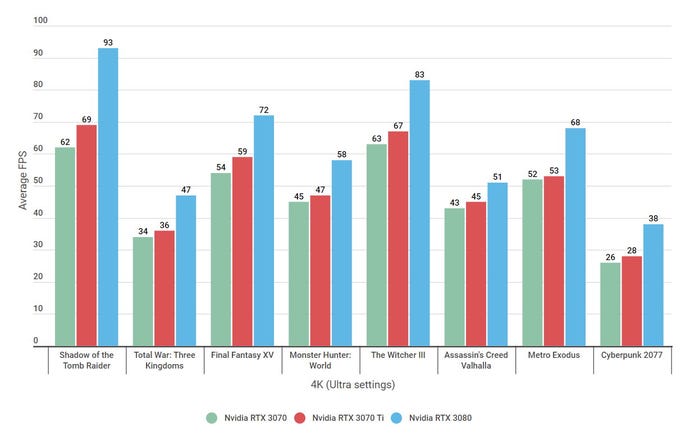
Traditionally, Ti cards have offered speeds much closer to the next card up - in this case, the RTX 3080 - but this clearly isn't the case with the RTX 3070 Ti. Indeed, as the graph makes plain, the RTX 3080 is way out in front, offering another 10-20fps on top of what the 3070 Ti's capable of in almost ever game going, giving you loads more performance for what would ordinarily only cost you roughly another £100 / $100 or so.
The only exception is Assassin's Creed Valhalla, where the RTX 3080 is just 6-8fps ahead of its 3070 series cousins - although this does start to widen as we go down the quality settings ladder. On the whole, though, you're looking at pretty much identical performance between the RTX 3070 and 3070 Ti here, and it's only the RTX 3080 that offers a tangible upgrade.
It's a similar picture when you drop the quality down to High settings as well. This is arguably the quality setting the RTX 3070 is most comfortable with, hitting between 50-60fps pretty much across the board. I've removed the games where it was already hitting 60fps on max settings for this graph (Tomb Raider and The Witcher 3), but in terms of relative performance, it's really not far behind its Ti sibling.
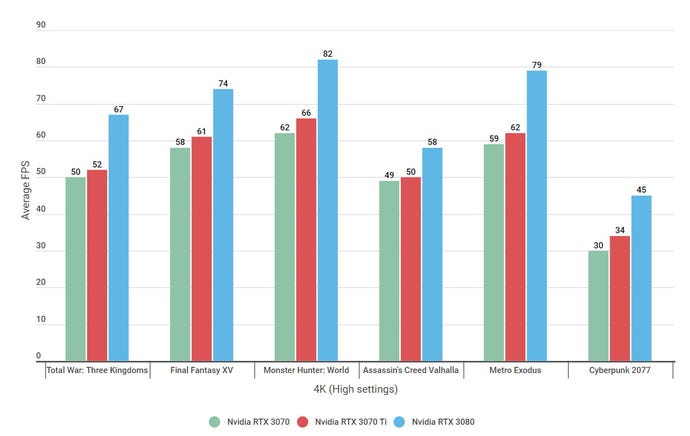
Once again, you're only looking at a difference of between 2-4fps at this quality setting, and heck, in Assassin's Creed Valhalla, the RTX 3070 Ti is only a single frame in front. You're really not missing out on much by opting for the regular 3070 here, and it's only by moving up to the RTX 3080 that you're going to get a noticeable difference in your overall frame rate.
Without wanting to sound like a broken record, it's pretty much the same story down on Medium settings as well. All three cards are more than capable of hitting a smooth and consistent 60fps in today's top games here, but the RTX 3070 Ti is still only ahead by an average of 1-4fps.
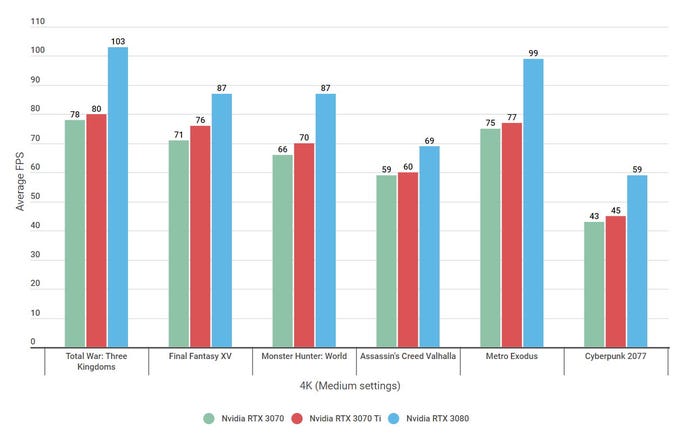
The RTX 3080, meanwhile, is well into the 90s and 100fps mark at this quality setting, making it a better fit for those of you with high refresh rate 4K monitors. Most of today's best 4K gaming monitors stretch to around 120Hz these days (if not 144Hz if you're lucky), so even though the RTX 3080 won't be able to fill those refresh rates completely (in today's big blockbusters, at least), it will stand a much better chance at doing so at 4K than either of its 3070 series siblings.
RTX 3070 vs 3070 Ti: 1440p benchmarks
If it's a stonking 1440p graphics card you're after, though, then all three RTX 30 cards deliver in spades here, even on Ultra settings. Arguably, Nvidia's RTX 3060 and RTX 3060 Ti are better value options for those after a great 1440p graphics card, but if you want guaranteed 60fps frame rates on maximum settings and the option to push into those higher refresh rates, then the RTX 3070 or above are more than powerful enough to get the job done here.
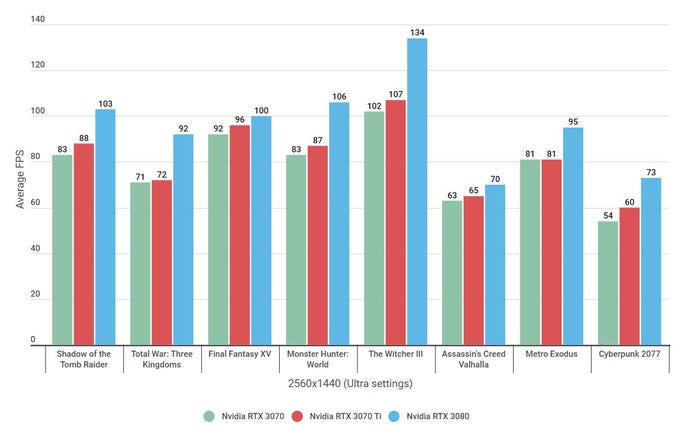
Yet again, though, the RTX 3070 Ti isn't actually offering you much extra performance over the regular RTX 3070. At worst, you're looking at nigh-on identical performance with a difference of just 1fps on average, and at best you're looking at an extra 6fps - which to my eyes looks exactly the same once you're into 80-90fps territory.
To be honest, while there are some games here where even the RTX 3080 struggles to make its mark - such as Final Fantasy XV and Assassin's Creed Valhalla, the 15-20fps boost you receive elsewhere still makes it a much better upgrade option from the RTX 3070 than the Ti. 80fps versus 100fps is something even my tired old eyes can tell apart. 80fps versus 85fps, on the other hand? Not so much.
RTX 3070 vs 3070 Ti: which is best?
As I concluded in my RTX 3070 Ti review, the latest addition to Nvidia's RTX 30 family is ultimately a big disappointment compared to Ti cards of yore. It doesn't offer anywhere near as much performance as you might expect from a Ti-level GPU, and under ordinary circumstances the regular RTX 3070 would be a much better buy for would-be graphics card hunters.
Of course, these are far from ordinary circumstances, with the ongoing graphics card shortage making new GPU starting prices pretty much irrelevant. If you can find one in stock at all, you'll likely find that RTX 3070 cards are just as expensive than RTX 3080s. Naturally, the most sensible thing to do would be to hold fire on buying a new GPU completely until this whole situation settles down a bit. Alas, the shortage isn't likely to resolve itself until 2022 at the earliest, according to the latest estimates from Nvidia and AMD, and so holding off on buying a new GPU may not be entirely feasible for you if your current one suddenly ends up going kaput, for example.
Still, if you do find yourself in need of a new GPU, then hopefully the graphs above have given you a better idea of how the RTX 3070, 3070 Ti and RTX 3080 all stack up against each other, and which one you might want to look out for once they're more readily available. For our money, the RTX 3080 is still our number one graphics card of choice for those after the best 4K gaming experience, while the regular RTX 3070 remains our top pick for those after great GPU for playing games in ultrawide and at high refresh rates at 1440p.
For more next-gen GPU comparisons, check out:
